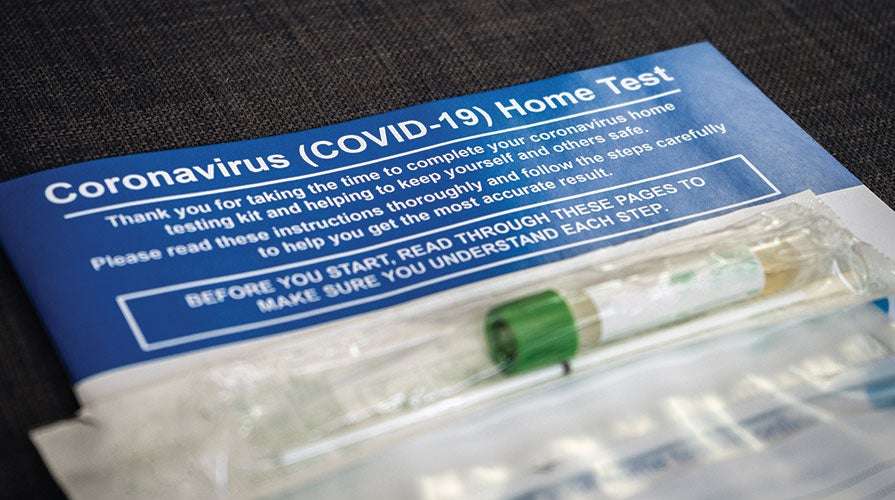Educator Appraisals and COVID-19
Now is the time for school leaders to review current educator appraisal procedures and policies, make needed adjustments, and publish a plan that provides a supportive and meaningful appraisal process for this year.
As school entities adapt and change their models of instruction based on the rapidly changing conditions of COVID-19, current mandates for educator appraisals remain in place for the 2020–2021 school year. The challenge for implementing the full appraisal process during a year affected by COVID-19 will be the inevitable pivoting between virtual and in-person instruction.
Flexibility is Key
To alleviate the anxiety and stress associated with the appraisal process, school entities may need to provide more flexibility for appraisals this year. While 19 TAC Chapter 150 provides specific requirements for the implementation of teacher appraisal systems, school entities also have some local authority to adjust the appraisal process where needed.
The first step for school administrators is to assess current procedures and local policy to determine if these processes are suitable for the current educational environment. School entities may need to take action to adjust observation cycles, push back timelines, or modify the overall appraisal process to address the challenges of evaluating instruction. School entities also may need to work with the board to make local policy changes, and they may even need to seek additional assistance or waivers from the Texas Education Agency (TEA) to ensure the entity is in compliance.
The key to ensuring the appraisal process is meaningful and supportive to educators is adjusting where necessary and communicating the process and plan to both administrators and teachers. While changes to the process may be temporary, an important step is to provide a supportive environment as schools re-open.
Important Resources and Reminders
School entities should make a yearly practice of reviewing current statute, as well as local policy related to educator appraisals. With ongoing changes due to COVID-19, school entities also should review TEA guidance related to educators and update information about the Texas Teacher Evaluation & Support System (T-TESS). A thorough review and understanding of current resources and guidelines for educator evaluation will help school entities successfully implement the appraisal process.
A few important reminders for entities implementing T-TESS include:
- Orientation: Schools must continue to provide orientation no later than the final day of the first three weeks of school and at least two weeks before the first observation. Reviewing the appraisal process with teachers is an important component of professional development at the start of the year and a must for teachers new to the profession.
- Goal setting: The six-week deadline for goal setting is still in effect. Submission of the goal setting and professional development plan must occur within the first six weeks following orientation unless a school applies for a waiver from TEA. For schools who were not able to complete the appraisal process last year, goal setting this year may need to be more robust. Appraisers may need to schedule additional goal setting conferences with both new and veteran educators to ensure all teachers are on the right track for this school year.
- Observations: Observations may look different due to varied instructional models and the timing of in-person vs. virtual instruction throughout the year. All observations require a written summary. Formal or scored observations require both pre- and post-conferencing in addition to the summary.
- Non-scored walk-throughs or “coaching” observations: These observations should be ongoing and occur regardless of the current instructional model provided by school entities. Appraisers should observe all teachers as soon as possible for the purpose of giving feedback and support and increase the frequency of walk-throughs for new or low-performing teachers. If school entities perform “scored” walk-throughs or observations, it recommended they delay scoring until teachers return to primarily in-person instruction.
- Formal or “scored” observations: These observations may look different based on the needs of the school. It is recommended that school entities wait to conduct formal observations until teachers are primarily performing in-person instruction. School entities may choose to delay scored observations for several weeks to ensure observations can occur during in-person instruction, as well as give teachers adequate time for preparation and acclimation to new instructional demands.
- End-of-year conferences: End-of-year conference requirements have not changed. The appraiser and educator will review all data during the conference and complete goal setting for the following year. Conference timelines may need to be pushed closer to the end of the calendar year; however, school entities must adhere to the current requirement to complete the conference and provide the written summary no later than 15 working days from the final day of instruction.
- Student growth: School entities need to have a plan for assessing students when they return to the classroom. Since entities cannot rely on STAAR assessment data from the past school year, they may need to re-evaluate how student growth will be measured this school year. Top priority for schools should be determining current baseline levels of student learning and creating a plan to assess growth at the end of the year.
Although the above reminders apply specifically to T-TESS, school entities who use an alternate system must still abide by timelines and requirements held within the locally adopted system. Implementing a strong appraisal process is necessary for all educators to grow professionally and meet the needs of every student.
Appraisals for Virtual Teaching
TEA is developing an aligned T-TESS rubric streamlined to evaluate best teaching practices in virtual instruction settings. The rubric addresses all current T-TESS dimensions within the planning, instruction, and learning environment domains (Domains I, II, and III) and communicates best practices in evaluating virtual instruction. Domain IV remains the same and will be assessed with the traditional T-TESS rubric.
The update to the current rubric is designed to be used for focused observations and to provide feedback with virtual instruction teachers whose primary teaching assignment is virtual instruction. The update is not recommended for use with teachers whose primary assignment is in-person classroom instruction. TEA anticipates the virtual teaching rubric to be available to school entities in late August 2020.
Teacher Incentive Allotment
School entities who are in the process of applying for the Teacher Incentive Allotment (TIA) need to determine if changes to the appraisal process will impact eligibility for TIA. The rigor of TIA requirements may preclude school entities from adapting appraisal requirements, so entities may need to think creatively to ensure they have proper data points and appraisal information for teachers, as required by TEA and Texas Tech University. Flexibility in adjusting the appraisal process may be possible if schools have a plan to collect full appraisal data by the end of the year. School entities anticipating participation in TIA who are interested in adjusting appraisal requirements should consult with the TEA.
Additionally, student growth measures may need adjustment to meet the requirements for TIA. Because STAAR data from the 2019–2020 school year is not available, entities may need to rethink data collection for student growth. The TEA plans to publish guidance in early fall for districts whose growth systems rely on STAAR data and/or the STAAR student progress measure. Additional resources for information about TIA can be found at tiatexas.org.
Additional Thoughts
Public education has changed, but school entities must keep in mind the importance of continued professional growth of teachers within the current educational environment. Through focused discussions, adaptations to current procedures and policies, and ongoing assessment of the current appraisal system, school entities can ensure they are compliant with current appraisal regulations while providing the best support possible for all educators in their schools.

Jennifer Barton
Jennifer Barton joined HR Services in 2018. She manages employee engagement surveys and assists with compensation planning, training, and other HR projects. Prior to joining TASB, Barton served for 19 years in Texas public schools as a principal, assistant principal, teacher, and coach.
Barton earned master’s degrees in education and educational leadership from The University of Texas at Austin and Lamar University. She holds a Texas superintendent certificate and is a SHRM-CP.
HR Services

Subscribe to HRX
Stay up to date with all the latest HR news and trends by joining the HRX mailing list!





